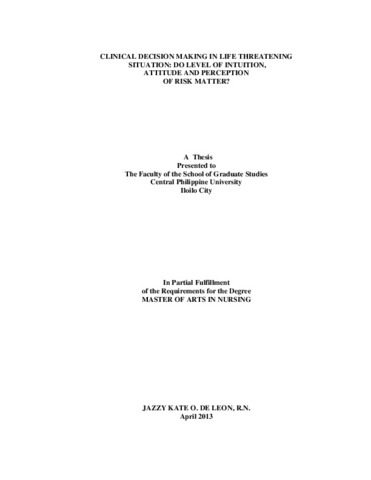Clinical decision making in life threatening situation: Do level of intuition, attitude and perception of risk matter?

Page views
745Date
2013Author
Thesis Adviser
Defense Panel Chair
Share
Metadata
Show full item record
Abstract
This study was conducted to determine the personal characteristics, level of intuition, attitude, perception of the degree of risk in a life threatening situation and clinical decision making ability among nurses in a private hospital in Iloilo City.
Specifically, this study sought answers to the following: determine the personal characteristics of the respondents such as age, sex, length of service, and area of assignment; determine the respondents level of intuition; determine the respondents Attitude towards Intuition; determine the respondents perception of the Degree of risk in a life threatening situation; determine the respondents Clinical decision making in terms of Rational ability, and Experiential Ability; determine if there is a relationship between respondents personal characteristics and their level of intuition; determine if there is relationship between respondents personal characteristics and their attitude towards intuition; determine if there is a relationship between respondents personal characteristics and the perception of the degree of risk in a life threatening situation; determine if there is a relationship between respondents personal characteristic and Clinical decision making in terms of rational ability and experiential ability; determine if there is a relationship between respondents level of Intuition and Attitude towards Intuition; determine if there is a relationship between respondents level of intuition and the perception of the degree of risk in a life threatening situation; determine if there is a relationship between respondents attitude towards intuition and the perception of the degree of risk in a life threatening situation; determine if there is a relationship between respondents Attitude towards intuition and Clinical decision making in terms of rational ability and experiential ability; determine if there is a relationship between respondents perception of the Degree of risk in a life threatening situation and Clinical decision making in terms of rational ability and experiential ability; and determine if there is a relationship between respondents level of intuition and Clinical decision making in terms of rational ability and experiential ability.
This is a descriptive-relational study which utilized a one shot survey design and was conducted last January 23, 2013 to February 8, 2013 in a Private Tertiary Hospital In Iloilo City. The target population was all the 87 nurses of a private tertiary hospital however, only 80 were taken as respondents.
The generated data of all the nurses were processed using the Statistical Package for the Social Sciences (SPSS). Frequency distribution, mean and median was used for descriptive analysis. Gamma and Cramer’s V was used to determine the existence and degree of relationship between variables. The results were interpreted using Garrett’s interpretation.
Majority of the nurses were females aged 26 years old and below with less than 2 years of experience and who are assigned in special areas. For their level of intuition, A higher percentage of the nurses have an average level of intuition.
A High percentage of the nurses have a favorable attitude towards intuition. Majority of the nurses perceived the situation to be a high risk. In terms of their clinical decision ability, majority of the nurses had a moderate rational ability and moderate experiential ability. A higher percentage of females aged 26 years old and below who had less than 2 years’ experience and are assigned in special areas had an average level of intuition.
Majority of the respondents who have a favorable attitude towards intuition are males, aged 26 years old and below with less than2 years length of service and are assigned in the general ward. There is a greater proportion of females aged 27 and above with more than 2 years length of service and are assigned in the general ward who had perceived the situation as high risk. Majority of the male respondents who are young, aged 26 and below, with more than 2 years experience and are assigned in the general ward had a moderate rational ability. On the other hand, a higher percentage of female nurses aged 27 and above with more than 2 years of experience and assigned in special areas had a moderate experiential ability. An equal proportion of those who have high and low level of intuition had a favorable attitude towards intuition. All respondents with low level of intuition had perceived the situation as high risk.
All respondents who had an unfavorable attitude towards intuition had perceived the situation as a high risk.
A higher percentage of those who have unfavorable attitude had high rational ability. Moreover, all respondents who had an unfavorable attitude towards intuition had a moderate experiential ability.
All respondents who perceived the situation as a low risk had a moderate rational ability. On the other hand, all respondents who perceived the situation as a low risk had a moderate experiential ability.
More than half of the respondents with high level of intuition had moderate rational ability. Moreover, all respondents who have high and low level of intuition had a moderate experiential ability.
Based on the findings of the study among 80 nurses, the following conclusions were made:
The respondents were below 26 years old, female, less than 2 years in service and are assigned in special areas.
Overall, the nurses had an average level of intuition, had a favorable attitude towards intuition, and perceived the situation as high risk and both have moderate abilities in terms of rational and experiential.
Age and length of service had a substantial correlation and a very high correlation to their level of intuition. As the nurse grows older and stays longer in the area, the higher his/her intuition is.
A substantial relationship is seen between level of intuition and attitude towards intuition which means that those nurses who had a high level of intuition had a more favorable attitude towards intuition.
There is a very high correlation between attitude towards intuition and the perceived degree of risk in a life threatening situation. There is an inverse relationship which means that as the attitude becomes unfavorable, the perceived degree of risk becomes high risk.
The perceived degree of risk of an individual in a life threatening situation had a high correlation to their rational ability. It is concluded that the higher the perceived degree of risk is the higher their rational ability.
There is an inverse correlation between level of intuition and rational ability. Therefore, as the level of intuition increases the rational ability declines.
Description
Abstract only
Suggested Citation
De Leon, J. K. O. (2013). Clinical decision making in life threatening situation: Do level of intuition, attitude and perception of risk matter? (Unpublished Master’s thesis). Central Philippine University, Jaro, Iloilo City.
Type
ThesisSubject(s)
Keywords
Department
School of Graduate StudiesDegree
Master of Arts in NursingShelf Location
GSL Theses 610.73072 D377
Physical Description
xvii, 111 pages


